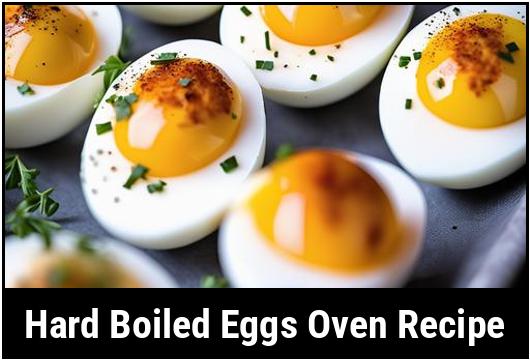
The Ultimate Guide To Perfectly Hard Boiled Eggs In The Oven
Eggs are a versatile and nutritious food that can be enjoyed in many ways. One popular method of cooking eggs is by hard boiling them. Traditionally, most people boil eggs on the stovetop using a pot of water. However, did you know that you can achieve the same delicious results by using your oven? This comprehensive guide will walk you through the science behind hard boiling eggs in the oven, along with step-by-step instructions, cleaning and preparation tips, doneness checks, variations, and more. Get ready to discover the art of perfectly cooked hard boiled eggs, right from your own oven!
Understanding the Science behind Hard Boiling Eggs in the Oven
Before we dive into the details of the oven method, it’s helpful to understand the science behind the process. When eggs are exposed to heat, several chemical reactions occur. One of the most important reactions is the denaturation of proteins, which causes the egg white and yolk to solidify.
Additionally, eggs contain sulfur compounds, which are responsible for their distinctive smell when cooked. When eggs are overcooked, these sulfur compounds break down further, leading to a strong and unpleasant odor. The key to achieving perfectly cooked hard boiled eggs is to find the right balance between heat and time.
Selecting and Cleaning Your Eggs
The first step to preparing hard boiled eggs in the oven is to select fresh and high-quality eggs. Fresh eggs will have a firmer white, making them easier to peel. It’s also important to check for any cracks or damage on the eggshell, as this can affect the cooking process.
Once you’ve chosen your eggs, it’s essential to give them a thorough cleaning. Start by gently rinsing them under cold water to remove any dirt or debris. Avoid using soap or other cleaning agents, as these can penetrate the porous shell and affect the flavor of the eggs.
Preparing the Eggs for Oven Cooking
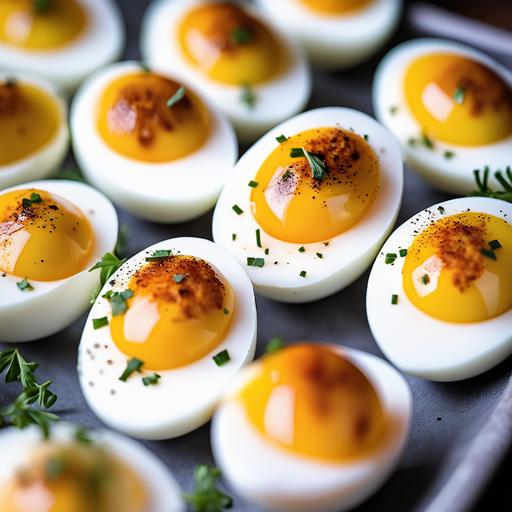
After cleaning the eggs, it’s time to prepare them for the oven. Start by preheating your oven to 325°F (163°C). While the oven is heating up, place each egg in a muffin tin or on a baking sheet. This will help prevent the eggs from rolling around during baking and promote even cooking.
Tips for Perfectly Cooked Hard Boiled Eggs
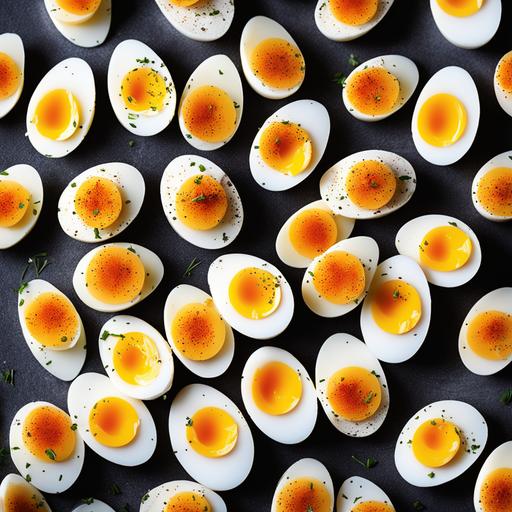
To achieve perfectly cooked hard boiled eggs in the oven, follow these helpful tips:
-
Baking Sheet vs. Muffin Tin: Using a muffin tin allows for more stability and prevents the eggs from rolling around. However, if you don’t have a muffin tin on hand, a baking sheet will also do the job, although it may result in slightly more movement during baking.
-
Room Temperature Eggs: For more even cooking, it’s recommended to let the eggs come to room temperature before placing them in the oven.
-
Turning the Eggs: To ensure uniform cooking, consider turning the eggs halfway through the baking process. This will help distribute the heat evenly.
-
Poke a Hole: If you prefer harder yolks, try poking a small hole at the rounded end of each egg before baking. This will allow steam to escape, resulting in a firmer yolk.
-
Avoid Overcrowding: To prevent the eggs from touching each other and help promote even heat distribution, avoid overcrowding the baking sheet or muffin tin.
Determining Doneness and Avoiding Undercooked or Overcooked Eggs
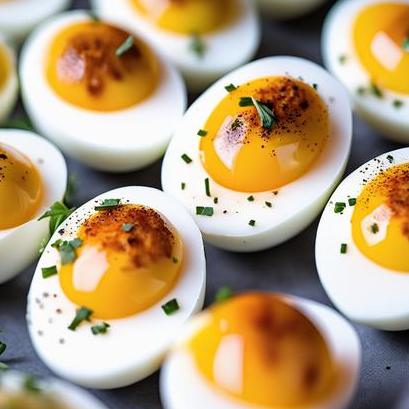
One of the trickiest aspects of cooking hard boiled eggs in the oven is determining doneness. Undercooked eggs have a soft and runny consistency, while overcooked eggs can become rubbery and prone to a strong sulfur odor. Here are some tips for achieving the perfect level of doneness:
-
Timing: Timing is crucial when baking hard boiled eggs. For a soft, slightly runny yolk, bake the eggs for around 25-27 minutes. For a firmer but still creamy yolk, increase the baking time to 28-30 minutes. Finally, for a fully set yolk, bake for 31-33 minutes.
-
Test for Doneness: To ensure your eggs have reached the desired level of doneness, remove one egg from the oven and carefully tap it on a hard surface. If the egg feels slightly firm but still gives a slightly wobbly sensation, it’s likely done. However, if it feels too soft or wobbly, place it back in the oven for a few more minutes.
-
Ice Bath: Once the eggs have reached the desired doneness, it’s important to prevent them from cooking further. Immediately transfer the eggs to an ice bath and let them cool for at least 10 minutes. The ice bath stops the cooking process and also makes peeling easier.
-
Peeling Tips: To achieve the perfect peel, roll the cooled eggs gently on a hard surface to crack the shell. Start peeling from the wider end of the egg, where there is usually an air pocket. Peeling under cool running water can facilitate the removal of any remaining bits of shell.
Variations: Adding Flavors and Textures
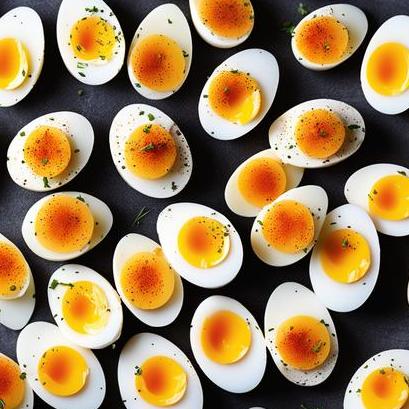
While plain hard boiled eggs are delicious on their own, you can also experiment with different flavors and textures by incorporating various ingredients during the baking process. Here are some exciting variations to elevate your hard boiled eggs:
-
Salt and Pepper: Before placing the eggs in the oven, sprinkle a pinch of salt and pepper on each egg. This simple seasoning enhances the natural flavors of the eggs.
-
Herbs and Spices: For a more fragrant and flavorful twist, try adding herbs and spices like paprika, dried dill, rosemary, or thyme to the eggshells before baking.
-
Citrus Zest: Infuse your hard boiled eggs with a refreshing citrusy note by grating the zest of a lemon, lime, or orange onto the eggs before baking. The subtle citrus aroma pairs perfectly with the creamy eggs.
-
Bacon and Cheese: For an indulgent treat, wrap each egg with a strip of bacon and secure it with toothpicks before baking. The bacon will render its flavor into the eggs, creating a delightful combination. You can also sprinkle some grated cheese on top for an extra cheesy touch.
Overcooking and Undercooking: How to Fix the Results
Despite following all the tips and guidelines, there may be times when your hard boiled eggs don’t turn out exactly as planned. If you accidentally overcook the eggs, resulting in a greenish-gray ring around the yolk, don’t worry! It’s still safe to eat, although it may not be as visually appealing. To prevent this from happening in the future, reduce the baking time slightly or adjust the oven temperature.
On the other hand, if you find your eggs slightly undercooked, simply return them to the oven for a few additional minutes until they reach the desired consistency. It’s better to slightly undercook than overcook, as eggs can continue to cook while cooling in the ice bath.
Recipe: Simple and Delicious Hard Boiled Eggs in the Oven
Now that you’re armed with the knowledge and tips, here’s a simple recipe to guide you through the process of making hard boiled eggs in the oven:
Ingredients:
-
Fresh eggs
-
Salt and pepper (optional)
-
Herbs and spices (optional)
-
Citrus zest (optional)
-
Bacon and cheese (optional)
Instructions:
-
Preheat your oven to 325°F (163°C).
-
Place each egg in a muffin tin or on a baking sheet to prevent rolling.
-
Bake the eggs for 25-27 minutes for a soft, slightly runny yolk, 28-30 minutes for a firmer but still creamy yolk, or 31-33 minutes for a fully set yolk.
-
Remove one egg from the oven and tap it gently on a hard surface to test for doneness. Adjust the baking time accordingly.
-
Once the eggs have reached the desired doneness, transfer them to an ice bath and let cool for at least 10 minutes.
-
Peel the eggs by rolling gently on a hard surface and start peeling from the wider end.
-
Serve the hard boiled eggs as is or experiment with different variations by adding salt, pepper, herbs, spices, citrus zest, bacon, cheese, or any other desired ingredients.
Enjoy your homemade hard boiled eggs straight from the oven!
In conclusion, cooking hard boiled eggs in the oven is a convenient and delicious alternative to the stovetop method. By following the science behind egg cookery, selecting fresh eggs, cleaning them properly, and adhering to timing and doneness checks, you’ll be able to achieve perfectly cooked eggs every time. Don’t be afraid to get creative with variations, and remember that even if you overcook or undercook the eggs, there are simple fixes and adjustments you can make to ensure a satisfying outcome.
Sources
FAQS On Hard Boiled Eggs Oven Recipe
What Is The Best Way To Prepare Hard Boiled Eggs In The Oven?
To prepare hard boiled eggs in the oven, start by preheating the oven to 325°F. Place the eggs directly on the oven rack and bake for 30 minutes. Once baked, immediately transfer the eggs to a bowl of ice water to stop the cooking process.
How Long Do Hard Boiled Eggs Need To Bake In The Oven?
Hard boiled eggs need to bake in the oven for approximately 30 minutes at 325°F. This will ensure that the eggs are fully cooked and ready to be used for salads, snacks, or any recipe that calls for hard boiled eggs.
What Are The Benefits Of Using The Oven To Make Hard Boiled Eggs?
Using the oven to make hard boiled eggs can be beneficial because it eliminates the need for boiling water and constantly monitoring the stove. It also provides a consistent and even cooking method, resulting in perfectly cooked eggs every time.
Can I Season The Eggs Before Baking Them In The Oven?
Yes, you can season the eggs before baking them in the oven. Simply sprinkle a little salt or your favorite seasoning on the eggshells before placing them in the oven. This will infuse the eggs with extra flavor as they bake.
How Long Can I Store Hard Boiled Eggs Made In The Oven?
Hard boiled eggs made in the oven can be stored in the refrigerator for up to one week. Store the eggs in their shells to maintain freshness, and use them in various dishes such as salads, sandwiches, or as a healthy snack.


